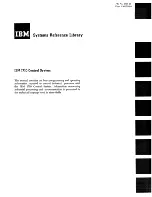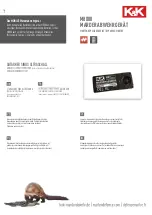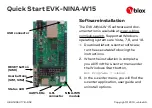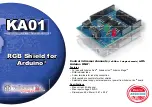
GUTTER
SENSOR
DRIP EDGE
Moisture Sensor Mounting & Termination
The remote DS-824C precipitation/moisture sensor may be
mounted in a number of ways depending on the application. The
sensor head operates at a safe 12VDC and can withstand
immersion in water. For roof and gutter deicing applications the
sensor head may be mounted against the back of the gutter with a
1” “C”-style conduit clamp. Allow part of the sensor grid to be
exposed to snowfall. The sensor will initially trigger when snow
starts falling and will remain triggered as long as the roof/gutter
heater continues to drip melted snow from the roof edge when
temperatures are below freezing. The sensor may also be installed
inside and near the top of the downspout using a 1” conduit
hanger and mounting plate. As water is melted in the gutter it will
run to the downspout,
hitting and retriggering
the sensor. We do not recommend laying the sensor on its side
in the gutter. Constant immersion will corrode the grid and the
sensor may miss a windblown snow trigger.
The sensor cable comes preinstalled but may be shortened as
needed. Strip the outer insulation and shield from the cable and
terminate each conductor following the color code printed on
the circuit board for TB-1; (W)hite, (G)reen, (R)ed, (B)lack. The
bare drain wire should be installed into the (S)hield terminal.
Tighten the strain relief on the DS-824C enclosure.
The sensor
cable may ONLY be extended using the ASE EX-50
Extension Kit.
Otherwise, erratic operation may result.
Selecting a Mounting Location for the DS-824C Enclosure
The brass cylinder protruding from the bottom of the enclosure is the temperature sensor. For proper
temperature detection the DS-824C
must be mounted outdoors
, away from furnace vents and other
sources of heat. Note that, when powered, the DS-824C moisture grid will always remain hot. This is
normal. This allows the sensor to continuously melt snow and evaporate both rain and snow from the grid.
The DS-824 can be mounted by screwing the base conduit hub onto an appropriate size free-standing
conduit or by using the mounting holes in each corner of the enclosure.
2
External Control/Monitor Operation
The DS-824C provides external control/monitor capability.
Shielded cable can be connected to TB2 to access this feature.
Connecting Black (4) to White (1) will activate the “Manual On”
function. Connecting Green (5) to White (1) will activate the
“Standby/Reset” function. See the “Manual Override Switch
Function” for a description of these modes. The Red/Orange
(2/3) leads are connected to an internal low power monitor relay.
This relay, rated at 24 VAC/VDC at 400 ma, will close with the load relay and can be used to externally
monitor activation of the sensor. This terminal block is also the connection point for installing a CDP-2
interface cable.
Note that the CS-1 described in the CDP-2 Manual is not required.
Power & Activation Indicator
A green lamp shines through a lens on the cover of the DS-824C to indicate operational status. If this lamp
is
OFF
the DS-824C is not receiving power. If this lamp is steady
ON
the DS-824C is powered but not
triggered. If this lamp is
FLASHING
the DS-824C is powered on and triggered, the main relay is closed,
and attached equipment should be activated. Note that, even though snow or rain may have stopped, the
DS-824C indicator will continue to flash during the Delay-Off drying cycle.
Preseason Snow Detection Testing
It is always a good idea to test the operation of the DS-824C prior to the winter season. Procure some
clean water and, if the outdoor temperature is above the trigger point, a can of spray component cooler
(Radio Shack Part #64-4321 or equivalent.) Clean the moisture grid following the procedure outlined above
and allow it to dry. Apply power to the DS-824C, drip some of the water onto the moisture grid, then spray
the temperature sensor protruding from the base of the enclosure with the component cooler. Once the
temperature sensor has reached the trigger point with water still present on the grid the DS-824C will
activate. The user should hear the internal control relay close and see the green lamp blink. Proper
operation has been confirmed. Allow the grid to dry completely. To clear the Delay-Off timer place the
override switch into “Standby/Reset”, and then back to the “Automatic” position.
Moisture Grid Maintenance & Replacement
It is recommended that the DS-824C be powered down and the grid wiped clean with clear water at least
once every 4 months. Heavy deposits may be removed using a non-metallic scouring pad (Scotch-Brite
TM
or equivalent.) However, after a number of years, the corrosive elements left behind when water is
evaporated out of the moisture grid will eventually damage the grid rings. The moisture grid can be easily
replaced by ordering and installing an MG-6 “Moisture Grid Assembly.” Reference the
“Moisture Sensor
Mounting & Termination”
section for information on replacing the precipitation grid.
Use Care When Replacing the Front Cover. Do Not Pinch the Gasket or Overtighten the Screws.
Maintain your enclosure's integrity and improve reliability
Specify the ASE EX-50 when precipitation sensor extension is required
7
General Safety Instructions
1.
THIS UNIT SHOULD BE INSTALLED, OPENED, AND REPAIRED BY QUALIFIED PERSONNEL
ONLY!
CETTE UNITÉ DEVRAIT ÊTRE INSTALLÉE, OUVERTE, ET RÉPARÉE PAR LE PERSONNEL
QUALIFIÉ SEULEMENT!
2. To avoid shock hazard do not open the front cover with power connected to the DS-824C or any
controlled equipment. Limit input voltage to 22-28 VAC/VDC
Pour éviter la décharge électrique déconnectez toute la puissance avant d'ouvrir la couverture du DS-
824C. Limiter la tension d'entrée à 22-28 VAC/VDC
Pin
Color
Function
1
White
GND/Common
2
Red
Deice On Mon A
3
Orange
Deice On Mon B
4
Black
Manual On
5
Green
Standby/Reset
DOWNSPOUT
SENSOR
MOUNTING
PLATE
1" CONDUIT
CLAMP


























